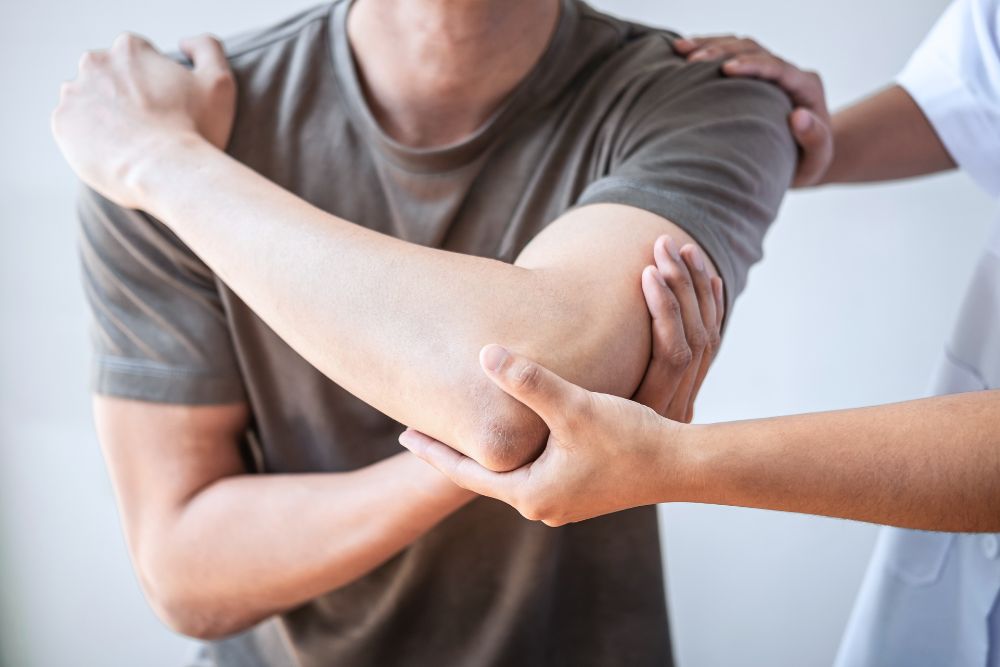
The rotator cuff is a group of tendons and muscles surrounding the shoulder joint that maintain the upper arm bone within its shallow socket. It is these muscles and connective tissues that allow movement of the shoulder joint, enabling you to lift and rotate your arm. When you experience a rotator cuff tear, it's common to feel aching pain in the shoulder that usually worsens in time without intervention.
What Are Rotator Tears?
A tear in the rotator cuff occurs when one or more of the tendons become damaged or completely severed. This type of injury can differ in severity and result from various causes. Here's an overview of the symptoms, causes, and treatment options for rotator cuff tears.
Causes
There are several causes of rotator cuff tears. One of the most common causes is wear and tear from continuous use over time. Other causes of rotator cuff tears include:
- Age (tendons and muscles weaken over time, increasing the risk of tears)
- The repetition of overhead lifting motions
- Engaging in sports that require constant shoulder movement
- Trauma or Injury (e.g., a direct fall on the shoulder, a sudden impact, or a forceful motion)
- Degeneration from long-term conditions such as bursitis or tendonitis
Symptoms
Symptoms of rotator cuff tears include:
- Muscle weakness in the affected arm and shoulder area
- A deep, dull ache in your shoulder
- Pain when lifting the arm or moving it in certain directions
- Difficulty reaching behind your back
- A cracking or popping sensation when moving the shoulder
- Pain or discomfort when sleeping, particularly when lying on the affected side
Orthopedic Care for Rotator Cuff Tears
Treatment options for rotator cuff tears depend on several factors, including the underlying cause, severity of the injury, and your overall health. Treatment can include preventative, conservative (i.e., non-surgical), or surgical treatment to repair the torn tendon.
Conservative (Non-Surgical) Treatment
Examples of conservative treatment modalities for rotator cuff tears include:
- Lifestyle Modifications – reducing or avoiding activities to prevent recurrence or further injury.
- Physical Therapy – specific stretches and exercises, as instructed by a physical therapist, to help alleviate pain and improve the range of motion (i.e., full movement) to the shoulder. Physical therapy helps improve strength and flexibility and helps decrease pain while improving the function of the affected shoulder.
- Pain Medication – over-the-counter pain or prescription medications may be ordered by the orthopedic specialist to help alleviate inflammation and pain.
- Corticosteroid Injections – anti-inflammatory injections, given directly to the shoulder, are often ordered to temporarily alleviate shoulder pain and swelling.
Surgical Treatment
When conservative treatment fails, several types of surgical procedures are available to repair rotator cuff tears, including:
- Arthroscopic Repair – minimally invasive surgery (i.e., a type of surgery involving smaller incisions and faster recovery time) to fix the torn tendon
- Open Surgery – open or traditional surgery involves a larger incision to enable the orthopedic specialist a full view of your rotator cuff. This type of procedure is performed to repair complete or larger tears.
- Tendon Graft – a surgical procedure using a tendon graft from another part of the body to repair the rotator cuff tear.
Early Intervention
The type of treatment ordered for rotator cuff tears depends on several factors including the severity and location of the tear, your age, and your overall physical condition. Your orthopedic specialist will create an individualized treatment plan based on a thorough diagnostic assessment. The chances of a successful recovery can be improved by early intervention and the right treatment. Contact The Orthopedic Health Center today to schedule a consultation at one of our offices in Hoboken, Jersey City, or Bayonne, NJ.
Appointments available now.
